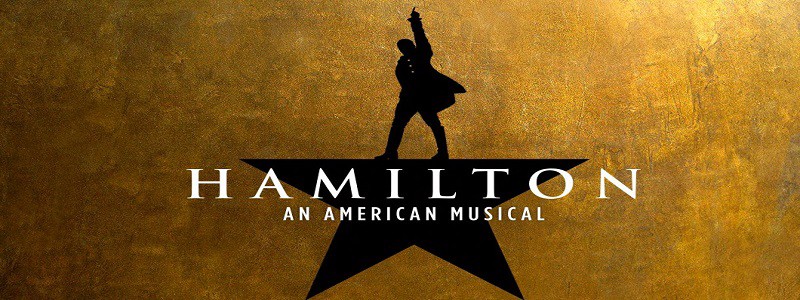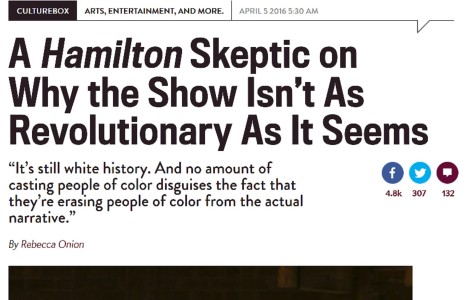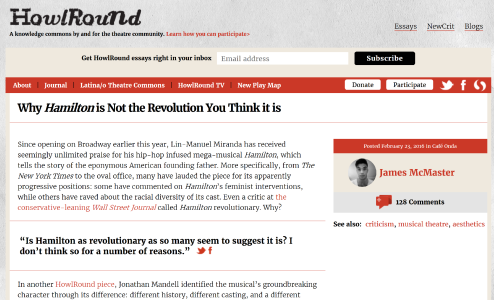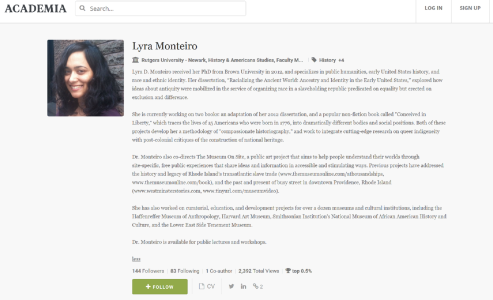
“Hamilton: An American Musical” and the Politics of History
Our Federalist v. Antifederalist project incorporates several clips from MacArthur “Genius” Award winner Lin-Manuel Miranda’s super-successful current play “Hamilton: An American Musical.” Miranda’s work — as most everyone probably knows by now, given how much attention it has received, from the academy, the theater, the music industry, the education sector, the media, even the White House — sets a drama based on the biography of America’s founding Treasury Secretary and the figure on the ten dollar bill, Alexander Hamilton, to hip-hop music and lyrics. Millions now — and not least, thousands of middle and high school students — have responded with great enthusiasm to this “story of American then, told by America now,” as the show’s clever marketing slogan has it.
Though “Hamilton: An American Musical” has been wildly successful, a rather sturdy critique has recently surfaced, one which presents a kind of an argument-centered offshoot opportunity to our Federalist v. Antifederalist project. Dissenters have emerged trying to hammer holes in the wall of praise the show has received. They are making some arguments that fall squarely within the realm of academic discourse, within disciplines such as history, social science, historiography, drama, music, and aesthetics. I could envision a robust week or two-week high school project that teaches and has students debating the incipient controversy over the politics of “Hamilton.
For sources of the critique, Rebecca Onion in Slate has many or most of the references in a current post —
He develops these claims:
1. “Hamilton” is sexist — or at least notably non-feminist — with lines and lyrics for female characters that are almost all about men (especially Hamilton) and the projects and activities of the “founding fathers.
2. “Hamilton” propounds a “bootstraps immigration” narrative that implies that Alexander Hamilton’s success from his humble background was solely due to his “working a lot harder . . . being a lot smarter . . . being a self-starter,” and ignoring structural inequalities and a system of subjugation that enforced racial and class barriers.
3. “Hamilton”‘s minority casting is a “misplaced revolution” that has actors of color portray what remains a white narrative, and one that leaves out the actual role (even though it was a subordinated, oppressed one) of people of color, including slaves, of the American Revolutionary period.
Then there’s Lyra Monteiro, a professor of history and American studies at Rutgers University, who published a rather powerful critique in The Public Historian in February —
The musical undoubtedly does have a special impact on this [a high school student] audience. Seth Andrew, the founder of Democracy Prep Public Schools [in New York City] took 120 students to see the show and reported, “It was unquestionably the most profound impact that I’ve ever seen on a student body.” And Miranda has noted that young people “come alive in their heads” when they’re watching the show. If the goal is to make them excited about theater, music, and live performance, great. But reviews of the show regularly imply that what is powerful about the show is how it brings history to life. So I ask again: Is this the history that we most want black and brown youth to connect with — one in which black lives so clearly do not matter?
For sources praising the play, one only needs to know where to find Google.com, but the Onion post above has links to supporters of it, and closely reading the hip-hop lines of the play themselves might supply the most convincing evidence to be analyzed by students in its favor.
The debatable issue might simply and directly be:
Is “Hamilton: An American Musical” a revolutionary piece of musical theater?OrDoes “Hamilton: An American Musical” function to democratize the teaching of the American Revolutionary period of U.S. history?




